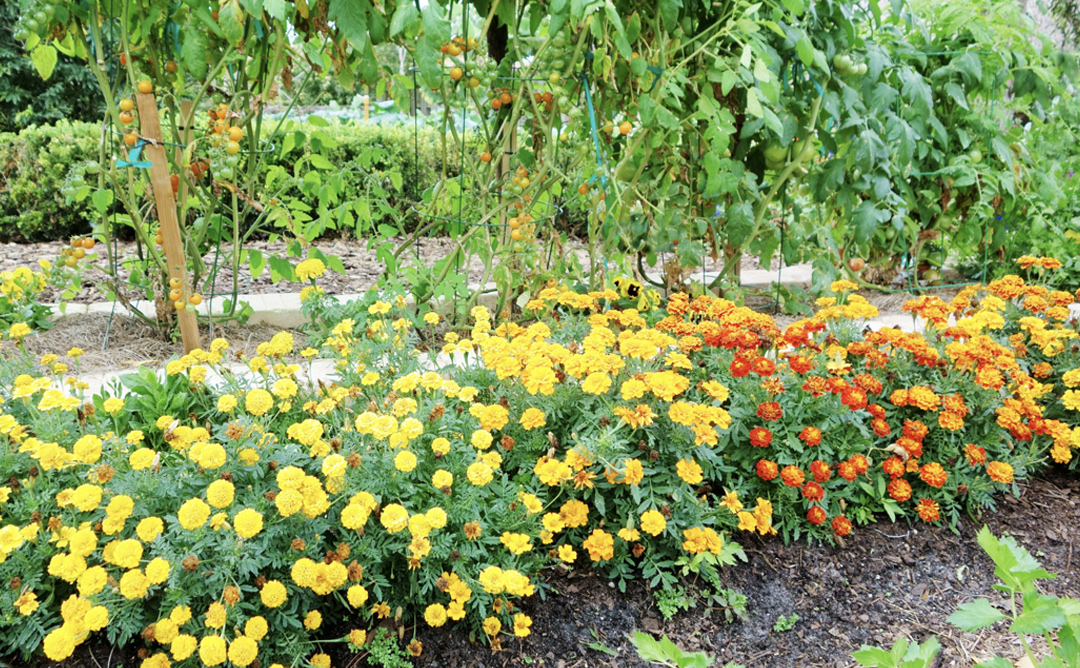
Companion Planting: Your Guide to a Thriving Garden
Gardening is not just about planting your favorite flowers and vegetables; it’s the art of creating a harmonious ecosystem where plants support and enhance each other’s growth. This age-old practice, known as companion planting, is a natural way to maximize the health and productivity of your garden. By carefully selecting and positioning plants that have beneficial relationships, you can create a flourishing garden that is more resilient to pests, diseases, and environmental stresses. Let’s delve into the world of companion planting and uncover how certain plant combinations can lead to a thriving garden.
The Benefits of Companion Planting
Companion planting offers a plethora of benefits for your garden, from pest control to improved growth and flavor. Here are a few key advantages:
- Natural Pest Deterrent: Certain plants emit fragrances or chemicals that repel garden pests, protecting neighboring plants. For instance, marigolds emit a scent that deters nematodes and aphids, making them excellent companions for tomatoes and peppers.
- Enhanced Growth: Some plant combinations can actually stimulate growth. Tall plants, like corn, can provide shade for sun-sensitive lower-growing plants, such as lettuce, helping them to thrive.
- Improved Flavor: Surprisingly, the presence of certain plants can enhance the flavor of their garden neighbors. Basil is known to improve the taste of tomatoes when planted nearby.
- Attract Beneficial Insects: Flowers like lavender and yarrow attract beneficial insects, including bees and ladybugs, which are crucial for pollination and natural pest control.
Genius Plant Combinations
Companion planting can significantly enhance your garden’s health and productivity. Here are the top 10 genius plant combinations, along with explanations of why they work so well together:
- Tomatoes and Basil
- Why: Basil repels flies and mosquitoes while potentially improving the flavor of tomatoes. The aromatic herbs can also attract beneficial insects and pollinators, which can enhance overall garden health.
- Carrots and Onions
- Why: The strong scent of onions, leeks, and chives can deter carrot flies, while carrots can repel onion flies and aphids, offering mutual protection against pests.
- Corn, Beans, and Squash (The Three Sisters)
- Why: This traditional Native American trio supports each other; corn provides a structure for beans to climb, beans fix nitrogen in the soil to nourish corn and squash, and squash spreads out to shade the ground, keeping it moist and weed-free.
- Cucumbers and Nasturtiums
- Why: Nasturtiums are a trap crop for pests like cucumber beetles and can enhance cucumber’s growth and flavor. They also attract pollinators and can add a peppery flavor to salads.
- Lettuce and Tall Flowers or Herbs (like Sunflowers or Dill)
- Why: Tall plants provide shade for lettuce, which thrives in cooler temperatures, reducing the risk of bolting in hot weather. They can also attract beneficial insects that help control lettuce pests.
- Peas and Carrots
- Why: Peas enrich the soil with nitrogen, which carrots need for growth. Their differing root depths mean they don’t compete for nutrients, making them excellent garden partners.
- Cabbage and Dill
- Why: Dill attracts beneficial wasps that prey on many cabbage pests, including cabbage worms. This combination helps to naturally reduce pest populations without the need for chemical pesticides.
- Spinach and Strawberries
- Why: Planting spinach around strawberries can help keep the ground moist and weed-free. Spinach benefits from the light shade provided by strawberry plants, which can enhance its growth.
- Garlic and Roses
- Why: Garlic can repel rose pests, including aphids and can help prevent fungal diseases. The strong scent of garlic is thought to mask the aroma of roses, making them less attractive to pests.
- Marigolds and Just About Everything
- Why: Marigolds are incredibly versatile companion plants. They repel nematodes, aphids, and many other pests through their roots and fragrance. Planting them throughout the garden can provide broad-spectrum protection for a wide variety of crops.
These combinations are beneficial for a variety of reasons, including pest control, improved growth and flavor, and soil health. Incorporating these partnerships into your garden plan can lead to a healthier, more productive, and more vibrant garden ecosystem.
Tips for Incorporating Companion Planting into Your Garden
- Start Small: If you’re new to companion planting, start with a few combinations and observe the results. This approach will allow you to learn what works best in your garden without overwhelming yourself.
- Plan Your Garden Layout: Before planting, sketch a layout of your garden, keeping companion plants close to each other. This planning phase is crucial for maximizing the benefits of companion planting.
- Rotate Crops Annually: To prevent soil depletion and pest buildup, rotate your plant combinations each year. This practice keeps the soil healthy and pests at bay.
- Mix and Match: Don’t be afraid to experiment with different combinations to see what works best. The beauty of gardening is discovering new synergies and solutions through trial and error.
Companion Planting for a Thriving Garden is a smart approach to promoting a healthier, more productive garden by harnessing the natural relationships between plants. By implementing these strategies, you’ll not only enjoy a vibrant and thriving garden but also contribute to a more sustainable gardening practice. Happy planting!
Join Our Facebook Group
Disclaimer: We are an affiliate of many companies, which means that we may receive a commission if you click on our affiliate link and make a purchase. However, this does not affect our reviews and comparisons. We strive to provide honest opinions and recommendations based on our own experiences and research. Any product claim, statistic, quote, or other representation about a product or service should be verified with the manufacturer, provider, or party in question.
